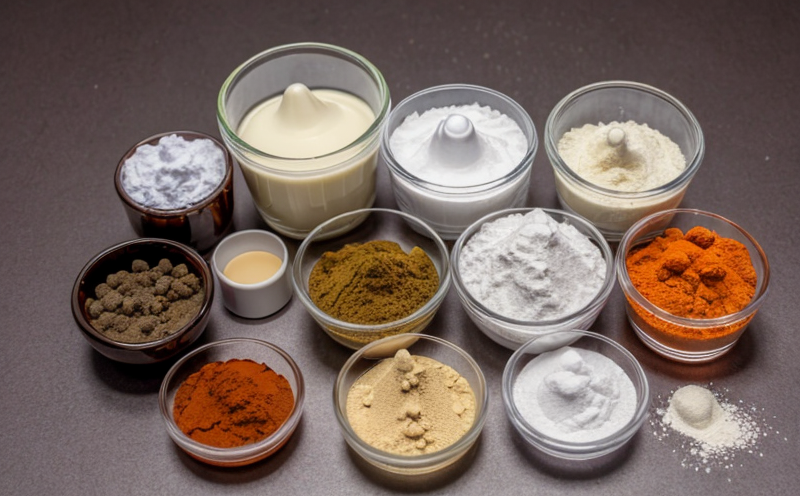Iodine Value Lipid Excipient Testing
The iodine value is a measure of unsaturation in lipids and excipients. This test is particularly important within pharmaceutical testing as it provides insights into the chemical structure of lipid-based excipients, which are crucial for drug delivery systems.
Pharmaceutical products often contain excipients to improve stability, enhance dissolution rates, or provide a vehicle for active ingredients. Among these excipients, fatty acids and triglycerides play a significant role due to their inherent properties. The iodine value test measures the amount of iodine absorbed by 100 grams of the lipid sample. This absorption is directly related to the degree of unsaturation in the lipid.
This service is especially relevant for sectors that require high-quality and reliable excipients, such as pharmaceuticals, food manufacturing, and cosmetics. The accuracy of the test impacts not only product quality but also patient safety. In this context, excipients must be stable and consistent to ensure they do not interfere with the active ingredients or degrade over time.
The iodine value test is a standardized method widely recognized by international standards such as ISO 3920:1983 and ASTM D974-15. These standards provide clear protocols for sample preparation, measurement techniques, and interpretation of results. The process involves titrating the lipid excipient with iodine until all reactive sites are saturated. The amount of iodine used is then calculated to determine the iodine value.
The test parameters for this service include precise temperature control during the reaction, accurate weighing of the sample, and careful handling of chemicals to avoid contamination or loss of reagents. Specimen preparation involves ensuring that the lipid excipient is in a homogeneous state before testing begins. This ensures reliable results by eliminating any inaccuracies due to uneven distribution or impurities.
The equipment used for this test includes analytical balances, titration systems, and temperature-controlled chambers. The precision of these instruments directly affects the accuracy of the final result. Regular calibration and maintenance are essential to ensure that the equipment remains within acceptable tolerances.
Interpretation of the results is crucial as it provides insights into the chemical composition and potential stability issues of the excipient. A higher iodine value indicates a greater degree of unsaturation, which can affect the physical properties of the lipid, such as melting point and solubility. Understanding these characteristics helps in selecting appropriate excipients for specific drug formulations.
The results from this test are reported according to the agreed-upon standards, ensuring that all stakeholders have consistent and comparable data. This transparency is vital for regulatory compliance and quality assurance processes within pharmaceutical companies.
In summary, iodine value lipid excipient testing is a critical component of quality control in the pharmaceutical industry. It ensures that excipients meet strict standards of purity and reliability, which are essential for safe and effective drug delivery systems.
Quality and Reliability Assurance
- Strict adherence to ISO 3920:1983 and ASTM D974-15 ensures consistency in test procedures.
- Use of calibrated analytical balances and temperature-controlled environments for precise measurements.
- Diligent sample preparation to ensure homogeneity and prevent contamination.
- Regular calibration and maintenance of titration equipment to uphold accuracy.
- Comprehensive reporting that aligns with industry standards, ensuring reliable data.
Customer Impact and Satisfaction
The iodine value lipid excipient testing service has a direct impact on customer satisfaction by ensuring that the pharmaceutical products they develop or purchase meet stringent quality standards. Accurate and reliable results from this test provide crucial information about the chemical composition of excipients, which is vital for drug stability and efficacy.
Customers who rely on this service can be confident that their products are free from defects related to lipid content. This leads to increased customer satisfaction as they can trust that the excipients used in their formulations will perform consistently across different batches. The ability to control and monitor these critical parameters allows for better decision-making during product development, thus enhancing overall product quality.
Moreover, compliance with international standards like ISO 3920:1983 and ASTM D974-15 adds credibility to the products being tested. This is particularly important in a global market where regulatory bodies demand consistent and accurate data from suppliers. By offering this service, laboratories help their clients navigate these complexities more effectively.
The transparent and detailed reporting provided by the laboratory ensures that customers have all necessary information at their fingertips, enabling them to make informed decisions about their excipient choices. This level of detail also supports internal audits and third-party inspections, further enhancing customer trust and satisfaction.
International Acceptance and Recognition
The iodine value lipid excipient testing service is internationally recognized for its high standards and reliability. Laboratories that offer this service are typically accredited to multiple international standards, ensuring that the results they produce meet global expectations.
Pharmaceutical companies worldwide rely on accurate iodine value measurements when selecting excipients for their products. The consistency and precision of these tests have earned them a reputation for excellence. This recognition is not only limited to pharmaceutical firms but also extends to other sectors such as food manufacturing and cosmetics, where the quality of excipients can influence product safety and efficacy.
International acceptance is further bolstered by the use of standardized protocols like ISO 3920:1983 and ASTM D974-15. These standards provide a framework for consistent testing methods across different laboratories, ensuring that results are comparable worldwide. This uniformity in methodology enhances trust among stakeholders and facilitates smoother international trade.
The laboratory’s commitment to quality assurance through rigorous calibration procedures and regular maintenance of equipment ensures that the iodine value measurements remain accurate over time. This reliability is crucial for maintaining credibility within the industry and fostering long-term relationships with clients.





